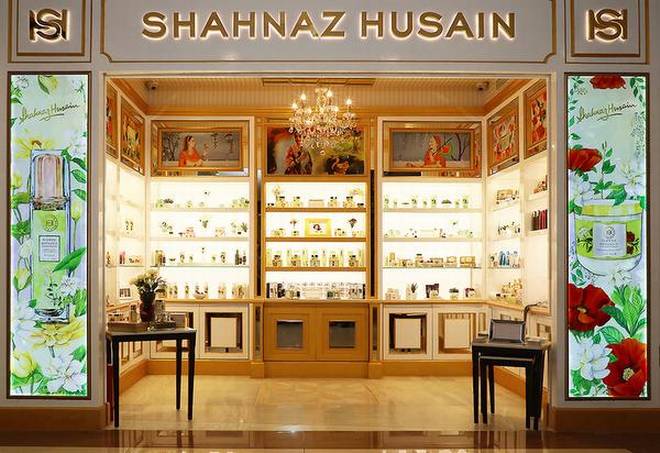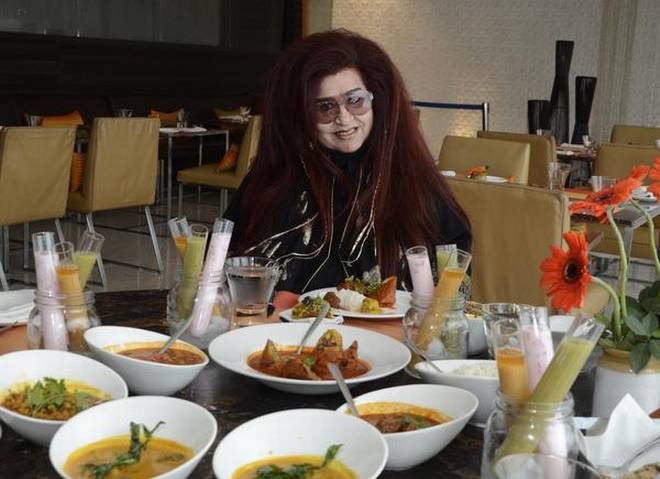NEW DELHI :
Entrepreneur, under-the-radar philanthropist and an over-the-top personality — the relevance of Shahnaz Husain 40 years after her first formulation
Shahnaz Husain’s press kit weighs 12.3 kilos, and contains press clippings from around the world. But then everything about her is over the top, and it’s not just her red hair threaded through with gold ribbons. Of her 58 homes, one is in Delhi’s tony Greater Kailash. There is a Rolls-Royce and a Jaguar parked up front, while inside is a sort of Midas-touch shocker. There are swans, a Ganesha, cushions, high-backed chairs, window valances, all in gold. There is an MF Husain on the wall that the artist did especially for her, large urns in the corners taller than people, horses sprinting across the carpet. Curios clutter, and I imagine a dusting nightmare.
She is not short on staff though. There are at least 15 people I have counted, and I am there just for a couple of hours. They appear, to offer food, tea, more food, juice; and to take instruction each time Shahnaz rings her bell to show me something — her first husband’s photograph, a letter from romance novelist Barbara Cartland’s friend’s son whose eyesight she cured, a picture of a man she picked up off the street because he was lame. They are dismissed soon after, with a wave of Madam’s hand.
She is wearing a blue-and-leopard print cassock-like garment, and holds forth for the next couple of hours. While she knows just what to say to the media, often telling the same stories, there is a certain warmth I feel, even as she holds my hand, her 70+ years, showing only in her hands.
Cosmetic shift
She begins with the first of many stories (these are her forte, not the dates or the details): when on a course with cosmetics entrepreneur Helena Rubinstein, she had a friend whose mother would come and sit outside the class because she was blind and had no one to take care of her at home. “She’d been a sought-after model who had worked for an eye make-up company,” says Shahnaz. She had modelled a new line, complaining to the manufacturers that her eyes would feel blurred after use. “They told her to wash them and put Optrix.” The blurring continued, until she simply could not see any more.
Shahnaz was learning what she calls “chemical beauty” at the time — Arnould Taylor, London; Christine Valmy, New York; Lancome, Paris; Swarzkopf, Germany; Lean of Copenhagen, Denmark. “There was no school I hadn’t been to, until Rubenstein started to say ‘we have nothing to teach you’.” She had funded herself through her writing work. Married at 15 to Nasir Husain, who was director foreign trade in the State Trading Corporation, she was determined to study. She did, for eight years.
Back in India when she was about 24, she set up a small factory in Delhi’s Okhla (that she still has) and “employed a yurvaids . I gave them the chemical formulations and asked them to convert them”. She also recruited chemists to make products for “treatment and cures” — falling hair, acne, pigmentation, dark circles, stretch marks. She asked people who came to her home salon to test them and give her feedback, tweaking each product as she went along. They retailed out of Sahib Singh Chemists in Connaught Place, in little white bottles with green caps and handwritten labels. That is the thing, she says. It has never been about beauty, but always about Ayurveda, in the days before it became a marketing tool.
Thinking beyond business
There is no marketing, in fact. At an address at Harvard Business School in 2015, she spoke about how she created a successful business sans advertising. Two years ago she told the same school in an interview how she entered Selfridges and broke a 40-year record, selling products worth £2,700 (approximately Rs. 2,63,500) in the first two hours, even as she displaced half of the space allocated to Pierre Cardin.
Her way of entering a foreign market is often through the Indian government (as in Selfridges, where Ingrid Bergman bought 12 of her cactus cleansing creams at the Festival of India), and by liaising with the press. She says wherever in the world she goes, ambassadors are happy to organise a press conference. She will talk Ayurveda, distribute samples, and get enormous press coverage. She is clear that the future is Ayurveda, not chemicals.
In fact, even as a young girl travelling the world studying, her father, Nasirullah Beg, a chief justice of the Allahabad High Court, would write to the ambassadors in various countries so his daughter could stay with them through the duration of the course.
But it is not just running a business; she is happy to dole out products made for cancer patients free of cost, especially those with patches of alopecia, and will pick people off the street, offering them jobs, connecting them to medical specialists.
Today, the company invests in R&D, with customers from salons testing them out, though it is not clear whether they know they are part of the research. She also talks in terms of “prescriptions” and “fairness creams”, a throwback to an era where protocols, both medical and social, were not as strict.
The label life
Earlier this year, the Shahnaz Husain brand was relaunched, with a new store at Delhi’s Select Citywalk, with new branding that seems rather mixed, with large pictures of flowers all over the frontage. Her face is still on some of the packaging, not retro-styled, but much like how it would have been done in the ’90s. She is not about to sell out or have anyone invest in the company. The brand is present in 40 countries today, including Iceland and Vietnam.
I dare not ask, ‘What after you?’ For Shahnaz is the brand.
As we conclude, she declares, “I think you have enough for a book now,” in her alto. Then she asks for her matching blue-and-leopard print bag, as we sit in her foyer, surrounded by a garden of plastic flowers, taking photos, with a couple of photographers jumping into the fray, seemingly from nowhere (waiting in the wings for this moment, perhaps). “Now we are best friends,” she declares, after we cut a cake, the done thing when a guest comes to her house for the first time.
She says wherever in the world she goes, ambassadors are happy to organise a press conference. She will talk Ayurveda, distribute samples, and get enormous press coverage. She is clear that the future is Ayurveda, not chemicals.
source: http://www.thehindu.com / The Hindu / Home> Features> Weekend / by Sunalini Mathew / October 13th, 2018










